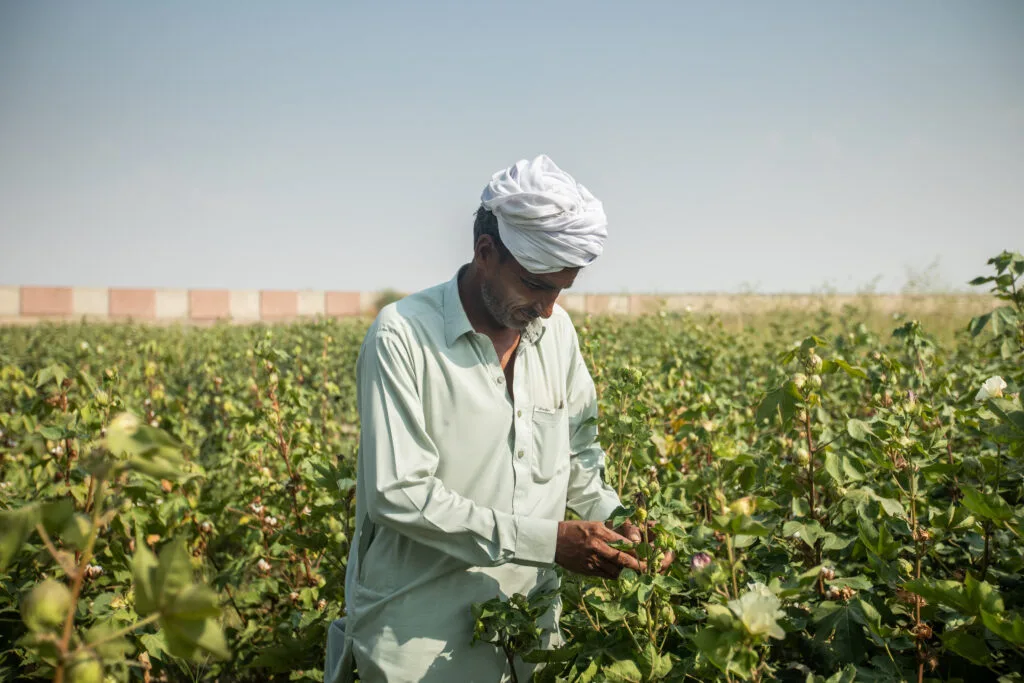
Better Cotton has today announced that it will pilot a new wage sampling tool across Pakistan’s1 cotton sector to capture accurate worker wages and boost wage transparency.
This is Better Cotton’s first initiative of its kind, aimed at better understanding the state of farm-level wages and creating strategies to drive improvements for the hundreds of thousands of people employed in the sector.
Challenges such as informal labour arrangements, labour mobility, a lack of documentation, and the prevalence of piece-rate pay – whereby wages are calculated based on output rather than time spent – have made it difficult to calculate farm-level earnings to date.
The new tool will identify and address data gaps over time by standardising how Better Cotton collects and monitors worker wages. This will initially be rolled out across a quarter of Pakistan’s cotton farms and scaled incrementally until it captures data representative of the country’s entire cotton sector.
There is huge optimism that a wage sampling tool can help standardise the collection and upkeep of data on farm-level earnings, first in Pakistan and then further afield. It could be a game-changer in further understanding wage data in cotton farming communities, helping us drive the improvements that are so desperately needed.
We are committed to ensuring that men and women workers receive fair & timely compensation for their labour. Enhanced wage data is not only critical for wage improvements, but also crucial for facilitating sector-wide dialogue on living wages and for informing future collective action to empower and protect cotton farming communities.
Better Cotton will work with its Programme Partners in Pakistan, SWRDO, WWF Pakistan, CABI and REEDS – who help implement the Better Cotton Standard System (BCSS) nationally – to leverage their insights and ensure that the wage sampling tool is tailored to the operating environment.
At SWRDO, we are committed to ensuring that Better Cotton farmers and workers receive at least minimum wages, and fair and just compensation for their hard work in our target areas. By advocating for the implementation of minimum wage standards, workers understand their rights and have the confidence to demand fair wages. We aim to uplift the livelihoods of thousands of workers and their families, fostering a more equitable and sustainable agricultural sector.
REEDS is proud to participate in this vital initiative, piloted in our operational area. This project not only benefits the country’s cotton sector by improving wage transparency, but it also underscores the importance of accurate wage sampling and effective survey tools in driving systemic change and ensuring fair compensation for workers. By contributing to this project, REEDS supports a more equitable agricultural sector and reinforces our commitment to sustainable development and worker rights.
Upon completing the project in March 2025, Better Cotton will explore how it can adapt the wage sampling tool to other smallholder countries with the view to defining living wage gaps, streamlining data collection and mapping action plans. A fundamental aspect of Better Cotton’s mission is to promote sustainable livelihoods2 by guaranteeing smallholder cotton farmers globally secure a living income3.
- In the 2022/23 cotton season, more than 350,000 farmers in Pakistan attained a Better Cotton licence. Collectively, they employ more than 170,000 workers.
- By 2030, Better Cotton commits to sustainably increase the net income and resilience of two million cotton farmers and workers.
- A living income is the net income that a household needs to earn to enable all members of the household to afford a decent standard of living.
This project was made possible thanks to a grant from the ISEAL Innovations Fund, funded by the Swiss State Secretariat for Economic Affairs (SECO) and UK International Development.







































